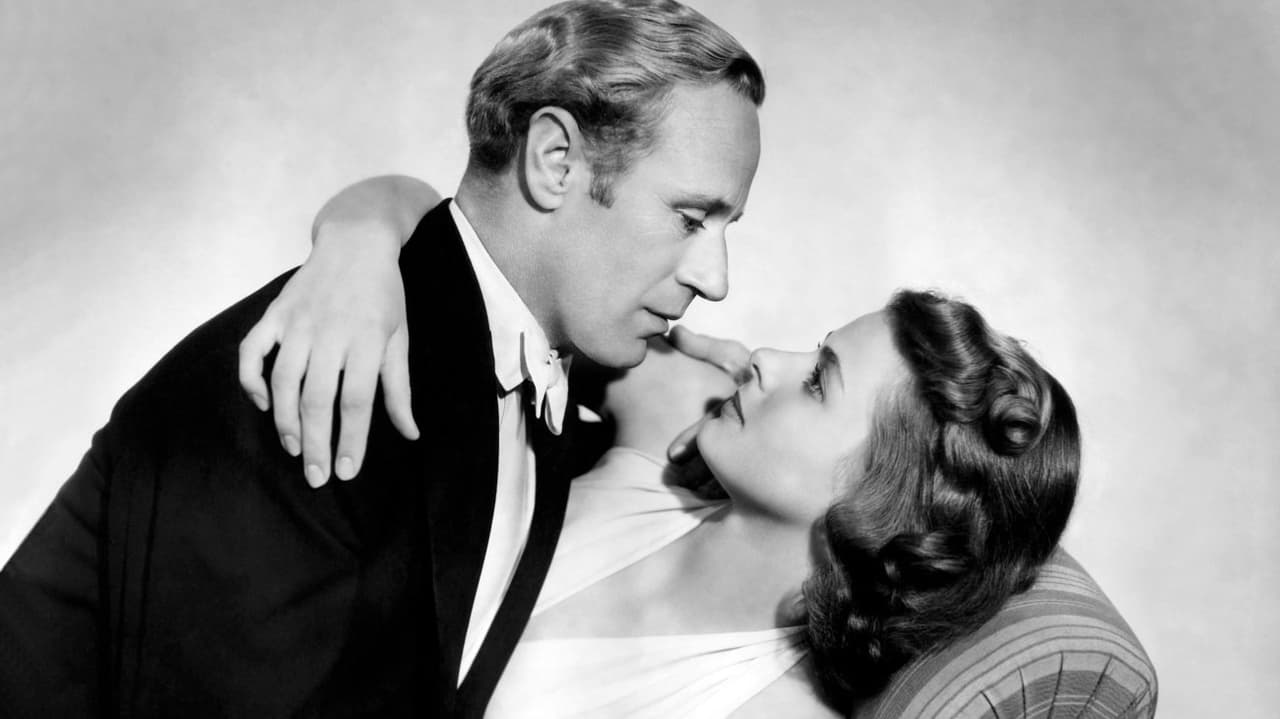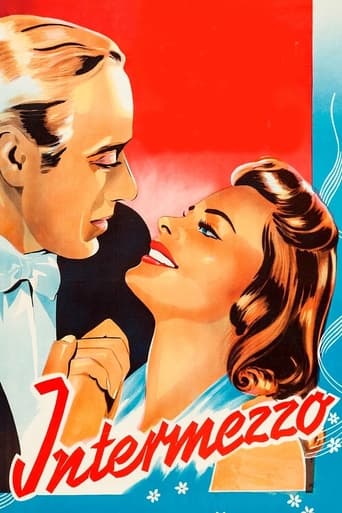James Hitchcock
At only 70 minutes "Intermezzo" is short even by the standards of the thirties. The story is simple and its moral equally so. Holger Brandt is a famous Classical violinist who falls in love with Anita Hoffman, his daughter's attractive young piano teacher. Holger leaves his wife and family for Anita, and they tour Europe together, with her acting as his accompanist. Anita, however, has a guilty conscience about having been responsible for splitting up Holger's marriage. She leaves him so that he can return to his family, who forgive him. The message is that individual happiness cannot be based upon the unhappiness of others.One contributor on this board states that he would not normally approve of a film about adultery, in which case his choice of viewing matter must be rather limited. His choice of reading matter must be even more limited, as adultery has always been one of the great themes of literature. The great literary chroniclers of adultery, however- Flaubert, Tolstoy, Fontane, Hardy, Balzac, Alas, Lawrence- treated the subject with much greater frankness, and with much greater depth, than do the makers of this film. (Perhaps because those writers had no Production Code to worry about). "Intermezzo" presents us with a rather sanitised version of adultery, in which at the end of the day no-one gets hurt and there is a happy ending for everyone- even for Anita, whose renunciation of the man she loves is presented as a noble gesture which will enable her to live in future with a clear conscience. The film has been described as a "weepie" or a "tear-jerker", but it seemed to me that there was precious little in it to shed tears over.Most literary treatments of adultery (Anna and Karenin, Emma and Charles, Sir Clifford and Lady Chatterley) paint a portrait of a deeply dysfunctional marriage; this film, however, paints a highly idealised one. The opening scenes of Brandt, his adoring wife Margit and their two children could be taken straight from an advert depicting the ideal family. There is no attempt to suggest any marital discord which might have contributed to Brandt's infidelity; adultery is simply presented as "one of those things that happen", like an accident.This is not Ingrid Bergman's greatest film, but her vibrant, lively personality shines through and she does enough to show why she was to go on to become a major Hollywood star. (Ironically, her career was to be damaged ten years later when she herself became involved in an affair with a married man, Roberto Rossellini). Leslie Howard, however, seems too much the perfect gentleman with no suggestion of a passionate nature below the surface. One cannot really imagine him as the sort of man who would jeopardise a seemingly idyllic marriage for a guilty fling.This film is a remake of a Swedish film of the same name, made three years earlier in 1936. The main purpose of the remake was to allow David O. Selznick to introduce to the American public his big new star, Ingrid Bergman, who had also starred in the Swedish version. Tom Cruise did something similar recently when, wanting to introduce to the American public a big new star, Penelope Cruz (who also happened to be his girlfriend), he produced, under the title "Vanilla Sky", an English-language remake of her previous Spanish hit "Abre los Ojos". There is, however, a difference. Cruise's film transferred the action from Spain to America and included several well-known Hollywood stars, including himself. The American version of "Intermezzo" by contrast, kept the Swedish setting of the original film. Moreover, none of the leading actors were American. Apart from Bergman, the two leading roles are played by British actors, Leslie Howard and Edna Best. Clearly, in 1939 there was no automatic assumption on the part of Hollywood filmmakers, as there is today, that American audiences took no interest in countries other than their own.It might, in fact, have been easier if the action had been transferred to America, as it would have spared the filmmakers the dilemma of how to refer to the European political situation. The film was made at a time when Europe was threatened by war, and actually opened a few days after war was actually declared. The view of Europe in 1939, however, is as sanitised as that of the Brandts' marriage. We see a continent at peace, with no reference to Nazism or the approaching conflict, beyond one brief allusion to "the time when Vienna was a happy city". This has been taken as a reference to the Anschluss in the previous year, although Vienna was probably not a particularly happy place under the authoritarian pre-1938 Dollfuss/Schuschnigg regime.In style the film is a romantic melodrama, complete with lush Classical music playing in the background. It is reasonably well made, but I was rather unhappy with its treatment of its subject-matter. In one of a number of musical metaphors, Anita says that she was just an intermezzo in Brandt's life. Most extra-marital affairs in real life are rather more than that. If only the damage done by infidelity could be repaired as easily as it is in this film. 6/10
sol1218
(Some Spoilers) Touching 1939 tear-jerker that introduced to the movie going public here in the USA the beautiful and stalely 23 year-old Swedish actress Ingrid Bergman as Anita Hoffman. Who's the piano teacher for the young Ann Marie, Ann E. Todd, the daughter of famed concert violinist Holger Brandt, Leslie Howard.After being a smashing success in America ending his concert tour at Carnegi Hall in New York City Holger tell his star struck admirers that he's leaving for his home in Sweden together his mentor and fellow musician Thomas Stenborg, John Holliday, to be with his family and get a long and well deserved rest from his grueling string of public performances. Back home with his loving wife Margit, Edna Best, and his two beautiful children Ann Marie and Eric, Douglas Scott, everything is wonderful for the Brandt family. Thats until Holger lays his eyes on Ann Marie's piano teacher, and also Thomas' music student, the stunning Anita Hoffman and it's love at first sight, or at first sound. Holger actually fell in love with Anita's music before he fell in love with her looks. In no time at all Holger and Anita fall in love and both leave together for Europe as a duet, him playing the violin and Anita the piano, on the concert circuit. The two musical dynamos tear up the continent with record-breaking crowds attending their performances as Margit and the children are left behind in Sweden. With the only contact from their estranged husband and father being the radio that broadcasts his and Anita's musical acts. Taking time off from their Europen tour the two lovers spend some time on the French coast where they run into Thomas who has, well both good and bad, news for them. The good news is that Anita has been awarded a scholarship to a major music academy and the bad news is that he has the divorce papers from Margit's lawyer for Holger to sign, which he doesn't. This bring a touch of reality into Holger and Anita's life where she realizes what she's done to the Brandt family by being the "Other Woman" in Holger and Margit's divorce papers. At the same time Anita tearfully leaves poor Holger all by himself by going back to Sweden to the music academy to accept her scholarship.Holger soon becomes a man without a country, or family, as he bums around Europe afraid to go back home to face his family that he so selfishly destroyed by having an affair with Anita. Getting up enough courage to bring himself to go back to Sweden to give Ann Marie a birthday present, a camera, that he promised her soon turns out to be a tragedy. The happy Ann Marie, after seeing her dad, runs across the street from the school yard only to get hit by a speeding car and left in a coma. Completely destroyed by his actions with his wife and son not even speaking to him and little Ann Marie on the brink of death or ending up crippled for life Holger, now for the first time, sees what a heel he was. Holger also sees how his love for another woman, who later left him, blinded him of all the good and wonderful things that he had in life. That he so foolishly threw away in the pursuit of his love, forbidden as it was, for Anita.The movies contrived ending is a bit far-fetched but it's just how you would want it to end.Leslie Howard is perfect as Holger the tortured soul who was torn between the beautiful piano teacher Anita and his loving wife Margit. You could understand his actions even though you wouldn't agree with them. As for Ingrid Bergman as Anita? she was simply beautiful.

